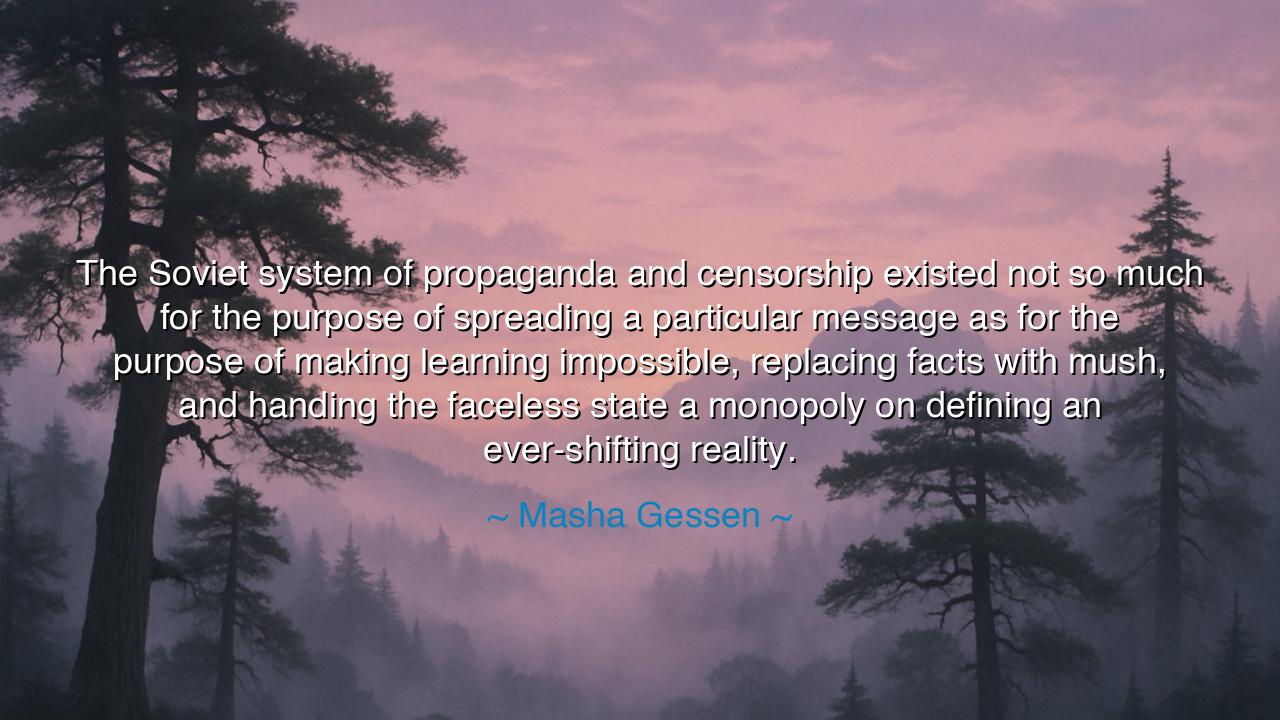
The Soviet system of propaganda and censorship existed not so
The Soviet system of propaganda and censorship existed not so much for the purpose of spreading a particular message as for the purpose of making learning impossible, replacing facts with mush, and handing the faceless state a monopoly on defining an ever-shifting reality.






In the piercing and courageous words of Masha Gessen, chronicler of truth in an age of deceit, we hear a warning forged in history’s cold iron: “The Soviet system of propaganda and censorship existed not so much for the purpose of spreading a particular message as for the purpose of making learning impossible, replacing facts with mush, and handing the faceless state a monopoly on defining an ever-shifting reality.” This is no mere reflection on a bygone empire — it is a lesson for all who would defend the light of knowledge against the encroaching shadows of control. Gessen, born in the Soviet Union, speaks as one who lived within the fog of lies, and her words carry the gravity of witness: the understanding that truth itself can be strangled, not through violence alone, but through confusion, distortion, and silence.
In her insight lies a deeper understanding of tyranny. The ancients knew that power, when corrupted, fears the light of knowledge more than the sword. A ruler who controls information controls thought; a ruler who controls thought controls the soul. Thus, the Soviet system, as Gessen describes, did not seek to persuade — persuasion implies dialogue, the possibility of reason. No, it sought to obliterate the very act of reasoning. It transformed education into indoctrination, curiosity into danger, and truth into a shifting mirage that only the state could define. In such a world, learning becomes impossible, for learning requires freedom — the freedom to question, to doubt, to compare, to imagine.
Consider the story of the great Russian writer Alexander Solzhenitsyn, whose words became the sword that pierced the silence of the Soviet night. In The Gulag Archipelago, he revealed the monstrous machinery of lies that fed upon human souls. He wrote that the first duty of every citizen in a repressive state is simply “not to live by lies.” For even a single truth, spoken boldly, becomes an act of rebellion against the empire of falsehood. Yet how difficult that act becomes when every word, every book, every classroom is infected with mistruth, when the language itself is reshaped until meaning collapses. This is what Gessen calls “replacing facts with mush” — not the destruction of knowledge, but its corruption, until the people no longer know what to believe, and, weary of confusion, they surrender their judgment to the state.
The ancients warned that tyranny does not begin with chains but with silence. Censorship, the quiet sister of fear, does not always shout — it whispers. It erases inconvenient truths, rewrites histories, and fills the air with comforting noise. Soon, the people forget what real thought feels like. They speak in the phrases they have been taught; they repeat what they have heard; and they mistake repetition for wisdom. This is how the monopoly on reality is established — not through force, but through forgetfulness. The mind, once vibrant, becomes dull; the heart, once curious, becomes compliant.
But Gessen’s words are not only condemnation; they are also a call to vigilance. For though she speaks of the Soviet past, the pattern she describes is eternal. Every age faces its own form of propaganda — sometimes wrapped in ideology, sometimes disguised as convenience or entertainment. When citizens cease to question, when they grow weary of discerning fact from fiction, when they allow their reality to be defined for them rather than by them, the slow death of learning begins again. The ancients called this decay the sleep of reason — and in that sleep, monsters are born.
The story of the Soviet Union stands as a monument to this truth. For when a people are denied the right to think freely, the result is not only political oppression, but spiritual starvation. Yet even in that darkness, there were those who resisted — teachers who smuggled forbidden books, poets who whispered verses in secret, parents who told their children stories of truth. Their courage preserved the soul of a nation, proving that knowledge, once kindled, cannot be entirely extinguished. The flame of inquiry, though dimmed, still burns wherever one person dares to seek truth against lies.
So, my children of light and reason, heed Masha Gessen’s warning: truth must be guarded as fiercely as freedom itself, for they are one and the same. Question what you are told. Read deeply, think freely, and never let comfort replace curiosity. Do not let others define your reality — build it upon the firm ground of discernment and fact. For in every age, there will be those who seek to rule not by wisdom, but by confusion. It is the duty of the wise to resist them, not with weapons, but with understanding.
Thus, remember this enduring truth: learning is an act of defiance against ignorance, and truth is the foundation of liberty. When we stop learning, we become captives of others’ dreams. When we question and seek, we become the keepers of our own destiny. Let Gessen’s words echo in your mind like a bell in the night — a call to awaken, to think, to know. For as long as we defend the freedom to learn, no empire of falsehood can ever truly conquer the human soul.






AAdministratorAdministrator
Welcome, honored guests. Please leave a comment, we will respond soon